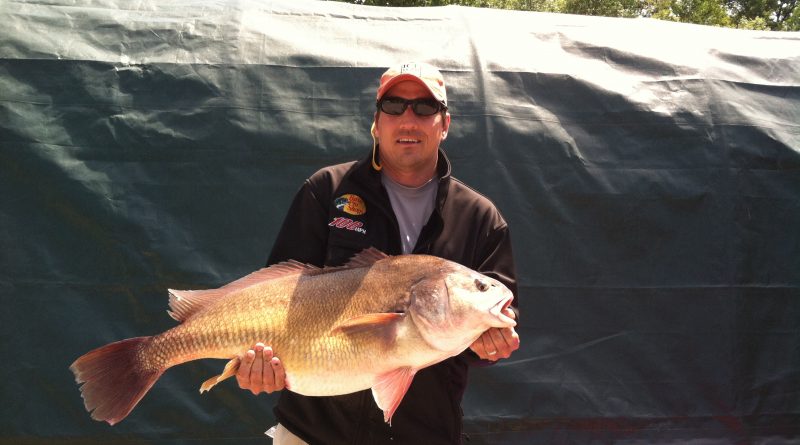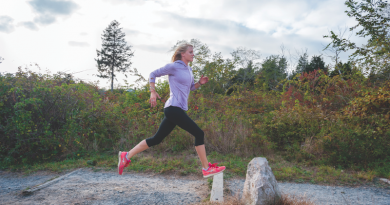Shane Lamos, The Derby King
In the 2014 Lake Champlain International Father’s Day Fishing Derby, Shane Lamos reeled in a 20.12-pound sheepshead, setting the record for the event’s warm- water division. In 2016, he caught a 21.67-pound sheepshead, breaking his own record. Success in the Derby is not new for Lamos or his LCI team, the Poachers. Together, they have won the warm-water T.E.A.M. division five different times, have placed 14 different fish in the individual species categories top 10, and have had numerous other top team finishes. Having grown up on Champlain, the lifelong angler and Derby participant knows fish–where to find them, how to catch them, and how to learn from every experience on the water.
Name: Shane Lamos | Age: 39 | Lives in: St. Albans | Occupation: Chemistry Professor at St. Michael’s College | Sports: Fishing
VS: How do you prepare for this year’s LCI Derby on June 17?
SL: We look at a lot of variables, including anything that impacts sh behavior: barometric pressure, lake level, lake temperature, wind direction, seasonal patterns, storm fronts coming in, storm fronts moving out. It gives us clues about the kind of behaviors we can expect from the fish. If there’s one secret to the process that people can learn from, it’s that the environment is always changing. The lake is dynamic. People who are successful — just like people who are successful in life— are people who learn to be nimble, and to change as the different parameters change. That’s really our secret.
VS: You’ve set some records. What techniques have brought you and your team success?
SL: What I would say is that we sh deliberately. I think this is true with anyone who fishes, or the professional fisherman you watch on TV, or fisherman who put in a lot of time–they just pay attention to the trends they observe. Fish are part of an ecosystem, and within that ecosystem, there are patterns of behavior you can key in on. Everybody fishes with some level of analysis of the environment, so they’re paying attention to the wind and the weather patterns that are developing. I think we probably just do more of it than you’d expect.
VS: As a scientist, do you keep a journal of where you fish and notes on what works?
SL: I’ve never really recorded everything, although I know people keep fishing journals of the sort. We aren’t really big on that, but we always had it in our heads, what kinds of situations we were presented with, what we did on those days, what was successful and what wasn’t. So then, on days that present themselves decades later, we ask ourselves: have we seen this kind of situation before? What kind of fishing days have we had under those conditions, and what should we try today?
I like to go out under any challenging circumstance and try to find fish. For example, I was going to go fishing in Winter Storm Stella, and I was thinking: what can I learn about fish behavior in the middle of an approaching Nor’easter that’s going to dump two feet of snow, and what kind of patterns would develop under those conditions? Now that’s not a pattern that’s likely to show itself again. It turns out I couldn’t go fishing because my kids’ school got cancelled. But that’s something that interests me, and it doesn’t interest everybody.
VS: What do you like to fish for?
SL: I like to catch new fish so I end up targeting things like logperch. Who goes out and tries to catch a logperch? It’s a giant minnow species that’s actually catchable on hook and line. But I just like the idea: where do logperch reside? Can I find a school of logperch? What would they bite on? Where would they be today?
One thing that’s really a testament to the people who built the LCI Derby, was that they include so many different types of fish. So sometimes in these derbies, it’s just bass, or it’s just salmon—the fish that people think are sexy. But the LCI Derby has carp, it has catfish, it has sheepshead. Who wants to catch those? I do.
The Derby gives you an option: it says “Here are 13 or 14 sh — pick whichever one you want to catch, and we’ll create a point system that makes it equitable to compete against each other.” What a brilliant design that is. It’s the only derby I do.
VS: How long have you been participating in the derby?
SL: I probably started fishing in the mid-’90s and I’ve been fishing with the same group of guys now for 18 years. As a group, we’ve had some success as individuals and as teammates. And quite honestly, until a couple of years ago, I had never gotten a fish in the derby that had actually got into the top ten. I hadn’t gotten lucky until 2014, when I finally caught the record-setting 20.12-pound sheepshead. I was pretty excited. And then in 2016 I beat that with a 21.7-pounder. It felt pretty good to beat my own record.


